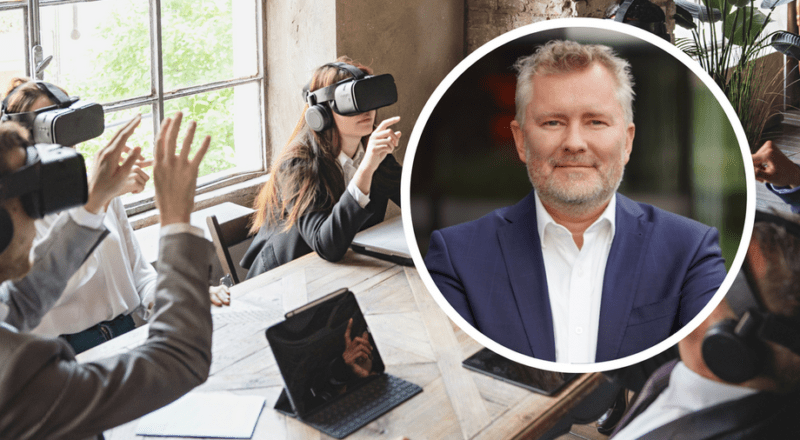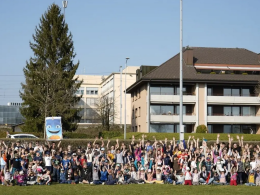The city of Zug is entering the metaverse with the help of a Zug IT consulting firm.
The "next stage of the internet", as the industry association Bitkom calls it, has become known worldwide through Mark Zuckerberg. The Facebook CEO announced last year that he would invest billions in the virtual alternative world.
Since then, one company after another has followed the trend - also in Central Switzerland. Right at the forefront is the Zug-based consulting firm Inacta. It enables companies to build up their presence in the metaverse. Like the Swiss insurer Smile, which has been offering customer meetings in the third dimension since this week.
Probably the most unusual client of the digital transformation company founded in 2009? The city of Zug. After the government has had good experiences with the promotion of crypto, the next step now seems to follow. Even if not for the public for the time being.
It's still a matter of getting to know each other
"We want to prevent the kind of quick fixes that are sometimes seen abroad," says Daniel Rutishauser, partner at Inacta. In the case of crypto, Switzerland has already succeeded in strengthening its reputation internationally through strict FINMA regulations. Hardly any place in the world is more trustworthy than the self-proclaimed "crypto nation" Switzerland.
The European Union showed how not to do it in December. It invited people to a big party with a live concert in the Metaverse. In the end, only six people showed up, as our Report shows. Swiss companies want to prevent such embarrassments.
Most of the assignments are about brainstorming and training in an internal context. The companies have to learn what is possible in the metaverse, explains Daniel Rutishauser. Often they start with virtual team meetings where the employees sit at a table as avatars. A simple presence costs just a few thousand francs, he says.
No more distractions
The experience with digital conferences is very good. When employees wear their VR glasses in a virtual room, they cannot have several programmes and other websites open at the same time as the conversation. The attention level is much higher than in a conventional zoom meeting, says Rutishauser.
In addition, the possibilities of virtual teamwork are almost unlimited. In the real estate sector, virtual customer tours could soon be offered. In the automotive industry, female engineers could work together on a virtual prototype. Or female customers could directly try out whether a piece of furniture fits in their house.
Of course, the external impact is also crucial for companies. In Central Switzerland, it is not easy to find skilled workers, says Rutishauser. With a VR offer, a company increases its attractiveness. The same applies to the city of Zug, because the public sector is not the first choice for female IT specialists.
From Dubai to Zug
Zug seems to want to build on its positive experiences from the crypto wave. In 2016, Zug was one of the first Swiss administrations to introduce bitcoin as an accepted means of payment. Almost half of the crypto companies operating in Switzerland and Liechtenstein are based in Zug and Zurich.
But Zug is not a pioneer in the metaverse. The developers are mainly in South Korea and Dubai, says Rutishauser. With their planned mega-desert city Neom, the Arabs are pursuing the most ambitious future project in the world. The desert state wants to invest one billion dollars - in the metaverse alone.
The city of Zug is following suit on a small scale. Inacta has helped to identify the first applications. Here, too, internal cooperation in virtual space is planned first. The Zug-based consultancy with a second office in Dubai cannot say when the whole thing will be made available to the public.
The development has begun
Hardly anyone doubts that the future belongs to the third dimension. Connoisseurs rather argue about whether "augmented reality", i.e. the digital extension of reality, will not become more important than the parallel world of Metaverse.
Daniel Rutishauser puts into perspective the fact that the computer game "Second Life" from 2003 started with similar promises but was never widely accepted. "The technology was not yet ready. But it should not be forgotten that 'Second Life' still has a large community and a lively economy today."
For several years now, the sales figures for VR glasses have been increasing worldwide. The technology community is eagerly awaiting Apple's planned glasses. Experts estimate that a device from the smartphone inventor from Silicon Valley could give the development an enormous boost.
This is good news for the Inacta from Zug. When asked whether they too have doubts about the mass suitability of the Metaverse, the consultant replies confidently: "We are realists. It is logical that we will get a 3-D extension of the internet."
Source: zentralplus









